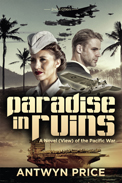
 |
This historical novel begins prior to the Japanese attack on Pearl Harbor. The era of colonizing was ending when European nations, including Britain, France, and the Netherlands, held Pacific islands as bases to supply popular and needed air flights. Planes that crossed this ocean in the early forties could land on either land or sea. The book’s two major heroes are English (Peter Parry, a civilian engineer) and American (“Bongo” Perkins, an officer assigned to Naval Intelligence) whose tasks are to build, supervise, and protect the islands’ infrastructures including bridges, sanitation systems, and housing. Peaceful and lazy tropical living changes with the rumor of four massive ships being built by Japan. The heroes race to notify the Americans at Pearl Harbor, but their message arrives a day too late. The goals of the region turn from peacetime construction to preparation for war. Bravery, intrigue, romance, and patriotism flourish in this new economy. The heroes change job titles and residences multiple times during the period from 1942 to 1945.
Born in Singapore, Price is extremely knowledgeable about his subject, wishing to show the “way it was” for residents of the Pacific region at this time. Sometimes, the storyline seems to proceed from the author taking a wide swing that hits anything of importance during the war in the Pacific. More specifically, Price takes aim at current topics: whether lesbian affairs resulted from men being separated from their families, how Negro men were treated in the army, or the value of nurses stationed at island hospitals serving injured men arriving by air or ship. Maps and historical photos provide needed insight frequently throughout the 390-page novel. At the end of the book is a helpful list of abbreviations and fictional characters. Real characters, such as Nimitz and MacArthur, make walk-on appearances or earn brief historical references.